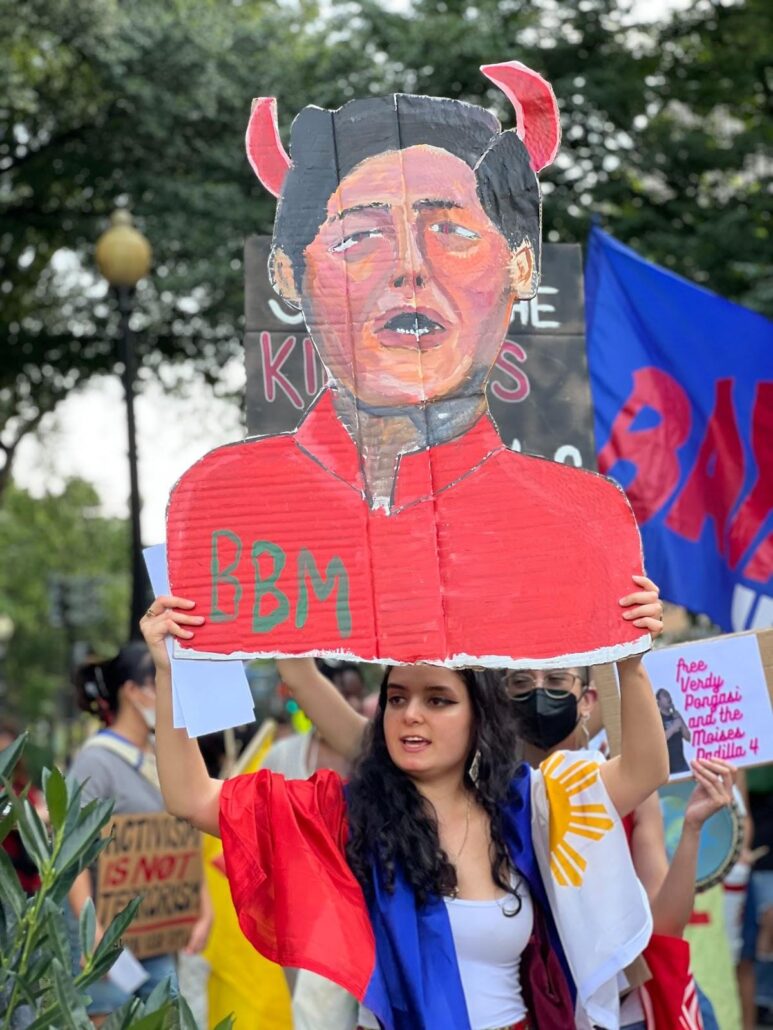Filipino groups in US hold People’s SONA protest
By Nuel M. Bacarra
Filipino workers, students, community members and solidarity partners in the Washington DC-Maryland-Virginia (DMV) region in the United States of America (USA) held a protest action last Sunday, July 23, in front of the Philippine Embassy ahead of President Ferdinand Marcos, Jr.’s State of the Nation Address (SONA) in Manila.
Calling for wage increases and decreases in the prices of commodities in their home country, the protesters criticized deplorable economic condition of Filipinos both in the US and the Philippines.
Migrante USA and BAYAN USA assailed the signing of the Maharlika Investment Fund (MIF) Law that established a corporation where the board members are all Marcos Jr.’ appointees.
“[The MIF is] a sovereign wealth fund that is supposed to come from the surplus of the government, but which will actual dip into the national coffers, the people’s money, our families’ pensions and will only be used for more patronage politics and shady corrupt deals,” BAYAN DMV said.
The organizations debunked government claims that MIF will stimulate economic growth and create jobs for people in the Philippines.
They said says it will further bury the country in deeper debt that will force many Filipinos to seek for better jobs abroad.

Plight of migrant workers in the US
Lily Guzman, worker-leader of PAWIS (Pilipino Association of Workers and Immigrants of South Bay), said migrant workers experience low wages and overwork because of continuing labor export programs under the Marcos Jr. government.
“When I was a live-in caregiver, I was working for 24 hours a day with a wage of only $1,200 per month,” Guzman said.
Undocumented workers are also often replaced by employers at a whim or, worst, reported to the US Immigration and Customs Enforcement agency for deportation, Guzman added.
Philippine consulates do not offer protection to Filipinos in the USA, the groups complained.
Nerissa Roque, a victim of an Asian hate crime in the USA, related: “When we visited the Philippine consulate in Los Angeles to ask for assistance, we were told the Assistance to Nationals (ATN) had a budget of 1 billion pesos for all overseas Filipinos, and that it was not readily accessible at that time,” she said.
Roque also said they were subjected to surveillance and their meeting at the consulate was in the presence of a Philippine National Police attaché.
Increased labor export
These complaints are different from Marcos Jr.’s rosy reports on the state of migrant workers in his SONA, however.
“We are engaging with our partners in the international community to ensure a safe working environment for our countrymen. As we do so, we are also putting in place responsive mechanisms for the social welfare, repatriation, and reintegration of our returning OFWs into the Philippine economy,” Marcos Jr. said Monday.
In his second address before Congress, Marcos Jr. praised the policy that first became a government program under his late father’s government.
“With the reopening of global economies post pandemic, the country has recorded an increase of migrant workers deployed abroad in 2022. They have contributed 32.5 billion dollars, or roughly 1.8 trillion pesos, to the Philippine economy,” he said.
Bayan USA however pointed out that things are not as well as as Marcos Jr.’s SONA makes it appear, citing a campaign launched by terminated workers of Jollibee in Journal Square, New Jersey who complain of “unfair and illegal labor practices the Philippine-based corporation practices abroad, including wage theft, chronic understaffing, and mistreatment of workers.”
“[W]e must also put pressure on the multinational corporations like Jollibee that continue to exploit the people. Both of them (Jollibee and Marcos) go hand-in-hand in furthering the suffering of the Filipino people,” Anakbayan Montgomery County (Maryland) said. #

